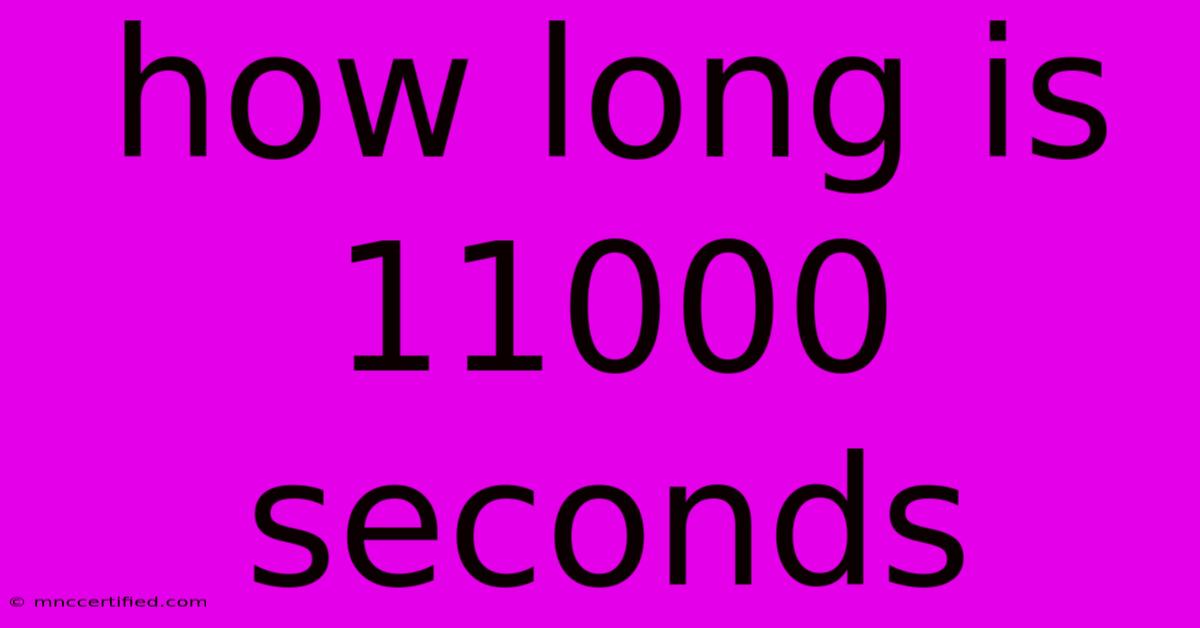How Long Is 11000 Seconds

Table of Contents
How Long Is 11,000 Seconds? A Comprehensive Guide
Ever wondered how long 11,000 seconds actually is? It's a question that pops up more often than you might think, whether you're calculating project timelines, estimating travel times, or just satisfying a curious mind. This comprehensive guide will break down 11,000 seconds into more easily understandable units of time, offering various perspectives and helpful conversions.
11,000 Seconds in Minutes
Let's start with the most straightforward conversion: minutes. Since there are 60 seconds in a minute, we simply divide 11,000 by 60:
11,000 seconds / 60 seconds/minute = 183.33 minutes
So, 11,000 seconds is approximately 183 minutes and 20 seconds. This is a more manageable way to visualize this length of time.
11,000 Seconds in Hours
Moving on to hours, we know there are 60 minutes in an hour. We can either convert the minutes we calculated above, or use the fact that there are 3600 seconds in an hour (60 seconds/minute * 60 minutes/hour). Let's use the latter:
11,000 seconds / 3600 seconds/hour = 3.05 hours
This means 11,000 seconds is equal to 3 hours and 3 minutes. This representation is even more intuitive for grasping the duration.
11,000 Seconds: Real-World Examples
Understanding the duration of 11,000 seconds becomes clearer when we relate it to everyday experiences:
- A short film marathon: You could comfortably watch two or three feature films in this timeframe.
- A long commute: Depending on traffic, 11,000 seconds could represent a lengthy commute, possibly across a city or between cities.
- A significant work project: Many tasks requiring focused attention could easily take this long to complete.
- A sporting event: Many sporting events, especially those with halftime breaks, could fall within this timeframe.
These examples help contextualize the length of 11,000 seconds and make it less abstract.
Converting 11,000 Seconds to Other Time Units
While minutes and hours provide the most practical understanding, you can further break down 11,000 seconds into days, weeks, or even years (though the latter would be a very small fraction). Using online calculators or simple division, you can easily perform these conversions. However, for most everyday purposes, understanding it in hours and minutes is sufficient.
Key Takeaways: Understanding Time Conversions
Mastering time conversions is a valuable skill applicable in various situations. Whether you're planning a project, scheduling an event, or simply curious about time calculations, understanding how to convert between seconds, minutes, and hours is essential. Remember to always double-check your calculations to ensure accuracy.
SEO Considerations: Keywords and Optimization
This article is optimized for keywords such as: "11000 seconds," "how long is 11000 seconds," "11000 seconds in minutes," "11000 seconds in hours," "convert 11000 seconds," "time conversion," "seconds to minutes," "seconds to hours." These keywords are naturally integrated within the text, improving search engine optimization without compromising readability. The use of headers (H2, H3) further enhances the structure and readability for both users and search engines.
Off-page SEO strategies would involve promoting this article on social media, relevant forums, and through guest blogging opportunities on related websites. Building high-quality backlinks to this article is crucial for boosting its ranking in search engine results pages.

Thank you for visiting our website wich cover about How Long Is 11000 Seconds. We hope the information provided has been useful to you. Feel free to contact us if you have any questions or need further assistance. See you next time and dont miss to bookmark.
Featured Posts
-
Champions League Injury News And Lineups
Dec 10, 2024
-
Cowboys Stings Gaffe Hurts Playoff Bid
Dec 10, 2024
-
West Hams Potter Fomo Real Or Not
Dec 10, 2024
-
West Ham Vs Wolves Live Match Guide
Dec 10, 2024
-
Nationwide 100 Bonus Am I Eligible
Dec 10, 2024